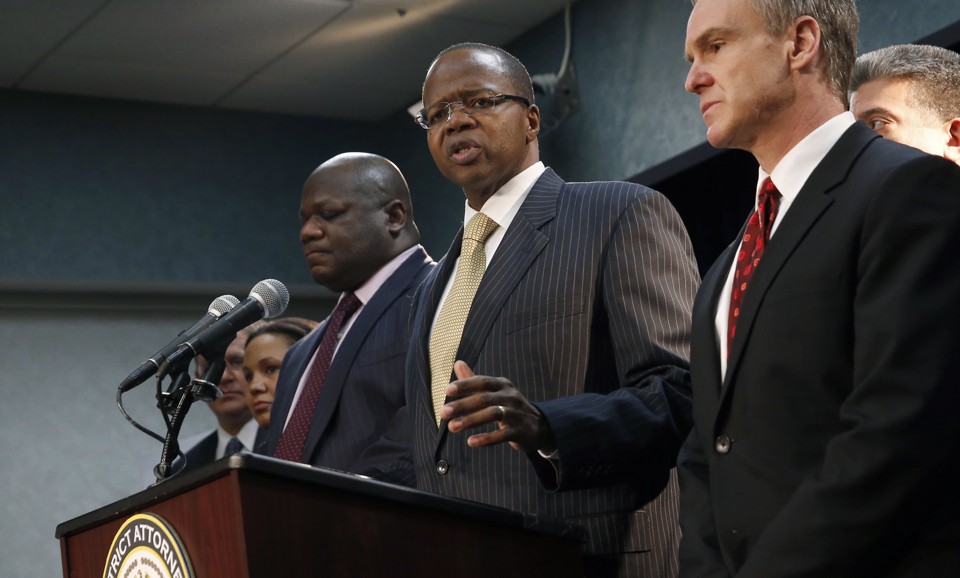Most States Elect No Black Prosecutors
The overwhelming dominance of white men among district attorneys could have huge effects on charging, enforcement, and plea bargains.

How overwhelming? Here are a few of the numbers, according to a report on elected prosecutors commissioned by the Women Donors Network and conducted by the Center for Technology and Civic Life, a nonpartisan group that grew out of the progressive National Organizing Institute:
- 95 percent of elected prosecutors are white;
- 79 percent are white men;
- three in five states have no black elected prosecutors;
- 14 states have no elected prosecutors of color at all*;
- just 1 percent of elected prosecutors are minority women.
In the U.S. legal system prosecutors may wield even more power than cops. Prosecutors decide whether to bring a case or drop charges against a defendant; charge a misdemeanor or a felony; demand a prison sentence or accept probation. Most cases are resolved through plea bargains, where prosecutors, not judges, negotiate whether and for how long a defendant goes to prison. And prosecutors make these judgments almost entirely outside public scrutiny.It isn’t just a lack of scrutiny—it’s the impossibility of scrutiny. As criminal-justice experts told Matt Ford, prosecutors aren’t required to keep statistics on the many of the most relevant matters, from racial bias in the charging process to how plea bargains are conducted. And even less of this data is currently collected, or reported, than in the recent past.
This ought to be worrying in a democracy: Although trying to assemble a government that perfectly represents each minority population may be a recipe for disaster—ask Lebanon!—the magnitude of the disparity here should startle even jaded observers. At the federal, state, and local levels, African Americans, Hispanics, and Asians hold elective office at rates lower than their percentages of the overall population, but even so, the gap among prosecutors is particularly large. There’s also little question that the U.S. justice system as it exists perpetuates and encourages huge racial gaps, leading to much higher incarceration rates for black men and serious social disparities in housing, education, employment, and beyond.
But just because prosecutorial discretion has a huge impact on the way the system works doesn’t necessarily mean that a more racially representative corps of district attorneys would close the racial gaps in results. (There are also reasons to be concerned about elected prosecutors per se; only three states—Alaska, Connecticut, and New Jersey—have appointed prosecutors.) Police departments that better represent the racial makeup of the population may be desirable in and of themselves, but more diverse police departments don’t seem to produce less police violence against black citizens. Since the problem is not the personal racism of officers but systemic racism, putting more black cops on the beat doesn’t solve it. Is there any reason to believe the case would be different with prosecutors?
A short answer is: surely not on its own. The decision by Baltimore City State’s Attorney Marilyn Mosby—a veritable unicorn as a black, female elected prosecutor, according to this report—to charge six police officers in the death of Freddie Gray is one of the more prominent cases of a prosecutor speaking out about racial disparities in the system and taking action to correct them. Another recently elected black prosecutor is Brooklyn District Attorney Ken Thompson. Thompson beat an aging incumbent who was implicated in multiple questionable investigations, and he immediately sought to address racial gaps in enforcement. He has indicted police officers who beat or killed black citizens, and he effectively decriminalized marijuana by refusing to prosecute low-level offenses, which tend to disproportionately fall on blacks (even though whites are actually more likely to use). But there are reform-minded prosecutors of other backgrounds, too. Toobin profiled Milwaukee County DA John Chisholm, who is white but has become obsessed with the racial disparities in his own system—which were invisible even to him until he began to seek data and then solutions to them.
Saying so is the easy part. Filling more of the posts by election, not by appointment, might help, but it’s hard to convince voters to surrender their ability to select officials, and whites and men (and particularly white men) dominate elected office across the United States right now, although some indicators have improved. Even as the solution seems elusive, the problem is glaring.
* This article has been updated to clarify that there are 14 states with no black prosecutors, rather than 15; the researchers originally reported the incorrect tally and updated their report post-publication.
No comments:
Post a Comment